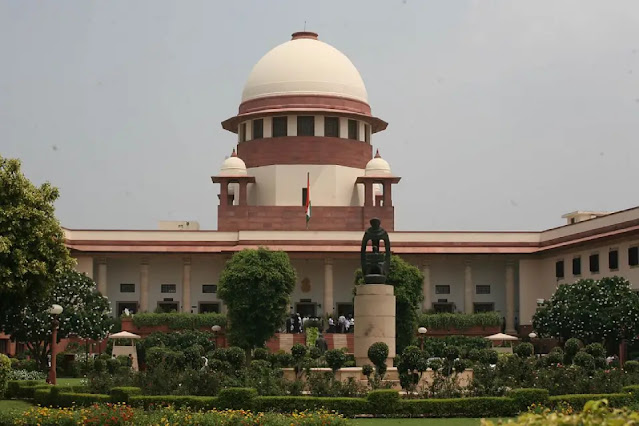Supreme Court-Introduction
In the unified judiciary structure of India - the Supreme Court is at the top, the High Court is in the middle, and then comes the position of other subordinate courts. Standing at the apex of the Indian judiciary the supreme court of India enjoys wide and varied powers that have made it one of the most powerful courts in the world. The nature and extents of its original jurisdiction, appellate jurisdiction, and advisory jurisdiction play an important role as the guardian of the constitution and as protector of citizens' fundamental rights.
 |
| Supreme Court of India |
Supreme Court's Role as the Guardian of the Constitution
The apex court or the Supreme Court is the federal court of India and India is a Federation, the power of the government is divided between the Union government and the state government and the Supreme court of India has to ensure that the division of power as specified in the constitution are followed by both the Union and state government.
Article 131 of the Indian Constitution mentions that the supreme court is empowered with the original and exclusive jurisdiction to settle disputes that have been arisen between the Union and the State/States, between two or more States, or between Union together with State/States on one side and State/States on another side. The power of adjudicating disputes that have arisen between the Union and the state or between the states is exclusive meaning that no other court in India shall have the authority to entertain any such suit.
The appellate jurisdiction of the apex court makes it the highest court of appeal in India. Article 132 states that any decree, judgment, or final order of the apex court of the State i.e the High Court within India's territory, be it a criminal, civil or other proceedings, shall be appealed to the apex court of India i.e the Supreme Court whenever the apex court of a State or the high court determines that a substantial question of law is involved with the case and a constitutional interpretation is required. The supreme court's interpretation must be acknowledged by all. It is by exercising its power of interpretation Supreme Court preserves the constitution. The provision that the law declared by the apex court shall be enforceable on all courts within the territory of India has greatly increased the supreme court's authority.
Supreme Court's role as the Protector of Fundamental Rights
The apex court of India plays a crucial role to protect and guarantee the fundamental rights of an Indian citizen as enumerated in part 3 of the constitution. The nature of fundamental rights is conditional or not absolute. As an absolute right can be a cause of anarchy and chaos, the parliament is entitled by the constitution to impose restrictions(which is considered as reasonable) on fundamental rights by law for the interest of the public. If the supreme court finds that the restriction imposed on fundamental rights is unreasonable after interpreting the meaning and content of the fundamental rights, it can uphold the fundamental rights guaranteed by the constitution.
As regards enforcement of fundamental rights of an Indian citizen, article 32 of the constitution states that the supreme court is entitled to issue writs in the nature of certiorari, habeas corpus, quo-warranto, prohibition, and mandamus for the implementation of the fundamental right. Thus according to the constitution, a citizen who is a victim of violation related to fundamental rights has the right to move to the apex court for the purpose of proper implementation of the fundamental rights. This provision has been described under Article 32 as the constitutional remedy and it is itself a fundamental right in Part three.
For the enforcement of the fundamental rights of the Indian citizen, the supreme court's power to issue writs is absolute and cannot be taken away by any legislation. This power cannot be suspended except during the proclamation of emergency. Again the apex Court of India is empowered with the power of Judicial review by which it can declare any law which contradicts or attempt to curb any of the provisions of part 3 of the constitution is invalid. If the supreme court considers any law enacted by the parliament or by a state legislature that has curbed or threatened to curb the fundamental right of the citizen, the supreme court may declare the law as unconstitutional and unlawful.
Conclusion:
The wide and varied power of the Supreme Court of India makes it not only the highest authority in the judicial field but also the interpreter, guardian of the constitution, and protector of the fundamental right of an Indian citizen. As the guardian of the constitution, the Supreme Court has been rendering the most useful service in preserving the unity of the constitution.




0 Comments
If you have any comments, contact me